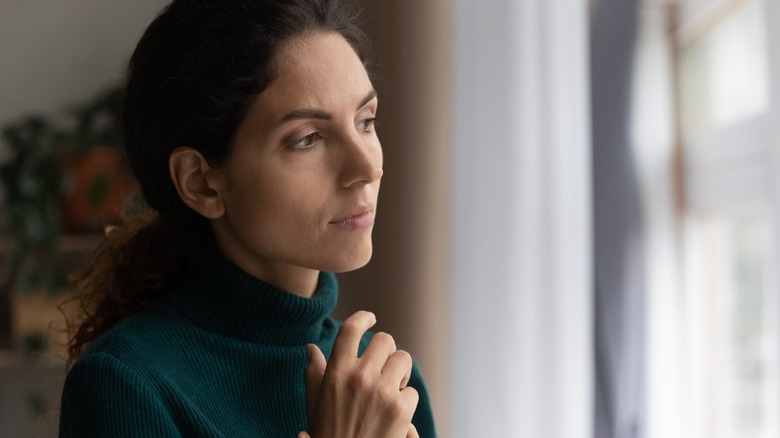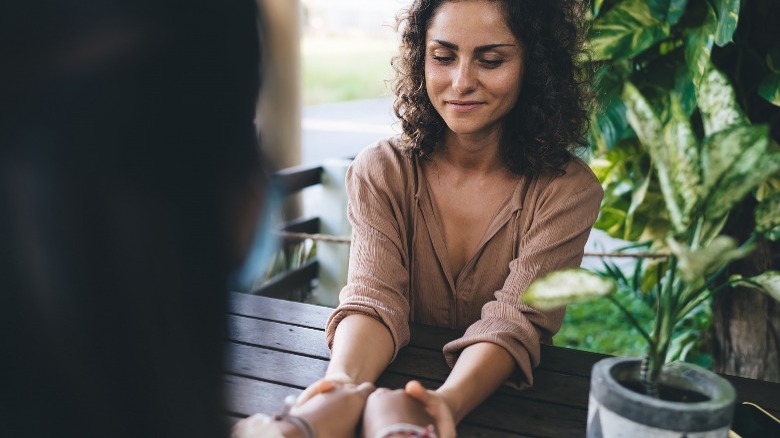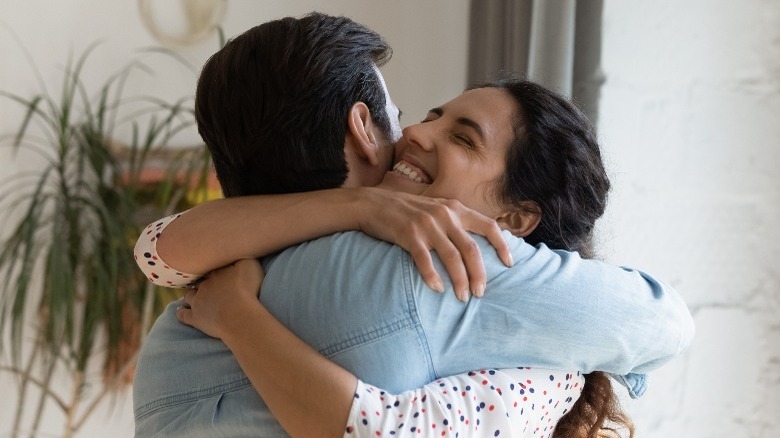What It Really Means If You're Resistant To Being Vulnerable In A Relationship
Vulnerability is a word we hear a lot in the lexicon of mental health lingo. But what does it mean to be vulnerable? Often deeply connected to our emotional experiences, being vulnerable entails expressing ourselves in a manner that feels true to us, even if it entails processing feelings that are difficult to hold. Used in the context of relationships, being vulnerable can sometimes mean being open to potential criticism or difficult emotional truths from your partner, which can be frightening. It is no surprise, then, that many people resist vulnerability — nobody wants to feel hurt.
"Being vulnerable in a relationship is letting your guard down to connect in a raw and open manner," clinical psychologist Dr. Shelley Sommerfeldt told Women's Health. "It means putting your heart on the line, even if that means heartache." Resisting vulnerability can be both a conscious act and a subconscious pattern that you might have adopted over time. Becoming aware of when you're resisting being vulnerable can tell you a lot about yourself and your relationships. Being vulnerable is a skill that can, with practice, feel easier to do. Vulnerability can also improve the quality of your relationships by opening up honest communication and could stop contempt from creeping in. When you come to think of being vulnerable as a path toward feeling your best long-term, the short-term discomfort can feel more manageable and purposeful.
Vulnerability prompts unpredictability
Being vulnerable requires giving up a level of control, which is why so many of us resist it. Understand that resistance is often an expression of fear. When it comes to resisting being vulnerable, are you afraid that your partner will invalidate your feelings? Are you scared of creating a conflict? Are you worried your partner will leave when they know your true feelings? The truth is that how your partner reacts to you is out of your control. And what might change as a result of being vulnerable might also be out of your control.
Being vulnerable means accepting your own, intrinsic right to feel your feelings, while acknowledging that your partner can do the same. When you put your emotions out there, you may at first feel like an open target to unpredictability. But once you've spoken your heart, you might just find that facing your emotions head-on, as well as working together with a partner to have open communication, is far more freeing than avoiding the imagined outcomes of being vulnerable.
Licensed couples therapist Alicia Muñoz told MindBodyGreen that closing yourself off from vulnerability can also be painful. "The irony is, when we do this, we end up robbing ourselves of the intimacy, connection, community, and love of the people who have the bandwidth and capacity to take us in as we are," she explained.
Vulnerability reflects our past experiences
People tend to avoid what has hurt them in the past as a method of preemptive self-preservation and protection. Knowing how your past experiences might influence you now can make being vulnerable less opaque. "Hurt is inevitable, and we may not be able to able to avoid pain; however, we can choose to treat ourselves kindly and lovingly when it comes," licensed family and marriage therapist Lisa Olivera told Healthline.
Consider the last time you were vulnerable with someone else. Perhaps you asked a colleague for their thoughts on a creative project you cared about, and they were unkind instead of constructive. Perhaps you expressed to a parent that you were hurt by something they did, and they responded by denying it happened. We might have subconsciously learned that being vulnerable with certain people, or about certain emotions, or regarding a certain aspect of our lives, leads to negative outcomes. So, we avoid it. Although it can take practice to truly believe, being vulnerable can lead to positive outcomes. What if your partner affirmed your feelings, and held you close? What if your bravery inspired your partner to open up about an emotional pain they were holding onto? What if you were able to let go of what burdened you, and felt supported in being your most honest self? Being vulnerable can do that, too.


